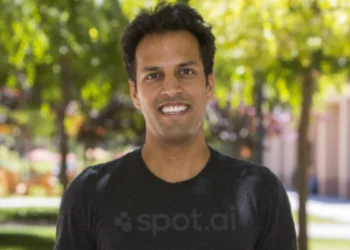Hang Chu is an entrepreneur and the co-founder and chief executive officer (CEO) of Viggle AI. Viggle AI is an artificial intelligence-powered video generator platform. It allows users to animate static images and easily create dynamic videos, even without prior animation experience. Since its release in 2022, it has gained popularity due to its innovative animation approach and ability to create engaging content.
“The model itself is quite different from existing video generators, which are mainly pixel based, and don’t really understand structure and properties of physics. Our model is designed to have such understanding, and that’s why it’s been significantly better in terms of controllability and efficiency of generation.”
Hang Chu
Hang worked at top tech companies including Facebook, NVIDIA, and Google before founding Viggle AI. This article will look into Hang Chu’s net worth, education, career, and more.
Hang Chu Net Worth
Unfortunately, there is no information on Hang Chu’s net worth available in the public domain. We will update this section as soon as we come across any reliable information regarding his acquired wealth.
However, Viggle AI has become increasingly popular with the internet users. Some of the most famous memes were created using this platform. So, it is expected that Viggle AI will continue to grow and potentially increase Hang Chu’s net worth.
Education
Hang Chu went to Shanghai Jiao Tong University, where he pursued a Bachelor of Science in Information Engineering. He graduated with a strong GPA of 3.90 in 2013.
Following his undergraduate studies, Hang attended Cornell University, earning a Master of Science in Electrical and Computer Engineering. He maintained a perfect GPA of 4.00 while conducting research in the Advanced Multimedia Processing Lab.
Hang then moved on to the University of Toronto, where he was a PhD candidate in Computer Science. He was part of the Machine Learning Group, focusing his research on advanced topics within the field of machine learning.
Career
Hang Chu’s career started with an internship at the Volkswagen Electronics Research Lab in 2014. As a member of the Driver Assistance Systems team, he contributed to HD mapping technologies for autonomous vehicles.
In 2015, Hang became a Visiting Student at the Toyota Technological Institute in Chicago (TTIC). During his five-month tenure, he worked on projects focused on localization using satellite imagery and navigating forest environments. This collaborative effort with MIT-Lincoln Lab further deepened his understanding of how AI and computer vision could be applied to complex real-world scenarios.
Following this, Hang Chu spent nine months as a Visiting Researcher in the Department of Computer Science at the University of Toronto. His work there concentrated on semantic scene understanding and computer vision, areas that are critical for enhancing machine perception and making AI systems more context-aware.
In 2017, the research scientist transitioned into industry-focused research with a summer internship at Google in Pittsburgh, Pennsylvania. Here, he worked on the Machine Perception team at Google Research, where his efforts were directed towards temporal semantic understanding for videos. This experience allowed him to delve into the intricacies of how AI can interpret and process video content over time, a key component in fields like autonomous systems and media analysis.
Hang Chu then joined NVIDIA in Toronto, Ontario, where he served as a Research Intern for a year. At NVIDIA Research, he focused on 3D content generation, an area that plays a crucial role in gaming, virtual reality, and digital media. His year-long engagement at NVIDIA provided him with significant insights into how cutting-edge AI technologies could revolutionize content creation.
In 2019, Hang’s expertise in telepresence and facial avatar generation led him to Facebook Reality Labs in Pittsburgh, where he initially worked as a Research Intern from May to August. His collaboration with Facebook continued into a longer role as a Research Collaborator. During this period, he contributed to projects that aimed to make virtual interactions more lifelike and immersive, which are essential for the future of virtual and augmented reality.
Hang’s career then took him to Autodesk in Toronto, where he became a Principal AI Researcher till the middle of 2022. At Autodesk AI Lab, he led efforts in 3D generative models and augmented product design and learning, pushing the boundaries of how AI can assist in creative and engineering processes. His work at Autodesk underscored his ability to blend technical expertise with practical applications, particularly in design and manufacturing.
Then in August 2022, Hang Chu co-founded Viggle. Based in Toronto, Ontario, he has been leading the company for over two years as its CEO.
Latest Updates
The Canadian AI Stratup, Viggle AI recently secured significant. The company announced that it had raised $19 million in a Series A funding round. This round was led by the prominent venture capital firm Andreessen Horowitz, with additional participation from Two Small Fish.
It will help Viggle AI scale its operations, accelerate product development, and expand its team. The company aims to enhance its AI models and broaden its user base, which already includes a mix of filmmakers, animators, video game designers, and independent content creators. The funding will also likely support Viggle AI’s ongoing partnerships with cloud providers like Google Cloud, which provide the necessary computational resources, such as GPU and TPU clusters, to train and run their advanced AI models.
FREQUENTLY ASKED QUESTIONS
Is Viggle AI free or paid?
Viggle AI is a free platform and also offers a paid subscription with more features.
Who is the CEO of Viggle AI?
The chief executive officer of Viggle AI is Hang Chu. Hang Chu co-founded the AI video platform in August 2022.


















